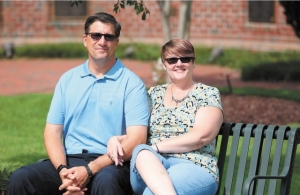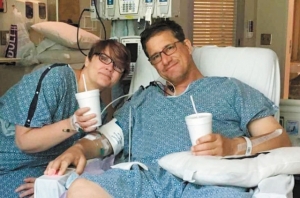An ultimate act of kindness
By Steve Herring
Published in News on August 27, 2017 1:45 AM

News-Argus/CASEY MOZINGO
Brian Volk and Beverly Webber pose for a photo in the Veterans Memorial Monday, two months after Webber donated her kidney to Volk.

Beverly Webber and Brian Volk are pictured a day after their surgery, which was June 12.
The brevity of life is at the heart of Beverly Webber's motivation and her philosophy that rings with kindness, compassion and love.
And for Brian Volk, the fragility of life was an all too acute reality.
Webber's philosophy of life and Volk's need to keep his fundamentally changed the relationship these two friends and neighbors had forever.
Webber donated her kidney to Volk, and though that may be the height and extreme of kindness and love, it saved his life and gave more meaning to hers.
It was just her way of helping -- something she believes everyone should do.
Volk jokes that his initials spell BEV, Webber's first name.
"The chances that the donor is your wife's best friend, your neighbor, your kids are together -- I mean there is definitely something above that worked in this equation," he said.
"I mean we are not even from the same country," said Webber who jokes that she had to leave her native England.
Webber recalls a friend of her husband who needed a liver transplant.
He never got it and died very young.
"I always thought how sad that was," she said. "So I know what it is like to be on the (transplant) list and not get something, and I knew that his (Volk's) chances on the list were remote. Life is really short. We are here for a really, really small amount of time. First of all, I really believe that we are put in someone's path for a reason. Obviously the reason Brian and I were put in each other's path is clear.
"We are here for such a small amount of time we should love each other, be kind to each other and we should help each other. If you can help somebody in anyway, you see an old lady struggling to put her groceries in the car, you go and help her."
"My thing was like OK I can give him a kidney. That might be a bit bigger than helping somebody with their groceries, but that was my way of helping somebody."
Yet, she calls Volk, who is medically retired veteran, a hero.
But Volk emphatically disagrees because, for him, it is she who is the actual hero.
"No, I'm not a dang hero," Webber said. "I just did something that was the right thing to do. What he did is heroic in my book."
"When you call me a hero I feel the same way (about her)," he said. "You are a hero. You saved a life."
*
Volk was medically retired from the military in 2010. About 10 years before he was diagnosed with polycystic kidney disease -- a genetic disease that caused cysts to form on his kidneys that continued to grow. He also had complications with his heart.
He started bleeding out from kidneys and needed blood transfusion.
The VA referred Volk to Duke Medical Center in July 2016. In August both of his kidneys were removed.
His left kidney weighed 25 pounds, the right, 10 pounds -- unofficial world-record size.
Volk said the surgeons who removed his kidneys advised him to get on social media or contact the newspaper.
Volk remembers the emotions as he struggled to rationalize he could ask somebody for something like this?
"I thought about it for a long time before I put anything on Facebook," he said.
Webber said she had never thought about donating a kidney until one night when the two families were talking over dinner.
She was asking Volk about being on the transplant list and asked about the possibility of living donors. It was shortly after Volk's kidneys had been removed.
"He laughed and said they would have to be A positive," she said. "Well, I am A positive. I will give you a kidney. He just looked at me and laughed. I said 'No, I am serious.' Everybody deserves a second chance no matter who you are you are on dialysis or whatever whether it's a lung, a liver, a kidney."
Webber said she did not even think twice about her offer.
She asked for the phone number to Duke Health every time she saw him, and he kept telling her he would give it to her. Once his post went on Facebook, however, she seized the opportunity.
"So I immediately called and left my information," she said. "They called me back the next week, and I did two phone interviews. In January, I had to go up and get the cross matching done. They called me the week after and said that was perfect."
She told Volk and said they were on to the next step -- a trip to Duke for a kidney function test and CT scan.
That was followed by a trip to Duke with her husband for a training session where the entire process is explained. She met with a surgeon, psychologist, social worker and the head of transplant coordination.
The group met on a Monday and Webber's coordinator told her she would call on Tuesday.
The phone rang at about half past four that Monday afternoon.
"I said, 'Oh, I thought you said you were going to call me tomorrow.'" Webber said. "She said, 'I never go home with good news.' She said, 'They said yes.'"
She called and told her husband, Erich, then went over to the Volks' home.
"I knocked on the door and (Volk's wife) Brenda came to the door," Webber said. "She looked at us like what the heck are you doing here right now. I think she just guessed and I went shhhhhhh. I said where is he?"
Volk was in his shed and his wife called him in.
Volk said when she told Volk that she was a match he was incredulous.
"'I said, 'They said yes.' He just looked at me and said no. I said yes and the beam on this man's face was incredible. I will never forget that moment."
For Volk, the experience of finding a donor was incredible.
"I mean 10,000 emotions go through you," he said.
"It is full spectrum from positive side to damn, I'm not going to have to be on dialysis anymore."
Webber said she was not afraid.
"People at work said, "Are you not scared?' No. I wasn't afraid. I knew I would be OK. We were going to Duke one of the leading hospitals in the world. They are going to take very, very good care of us. No I was not afraid. I was not apprehensive. I don't know why. I just knew it would be OK. I just knew it would work."
Volk saw different sides.
"If she gets sick how am I going to deal with that?" he said. "Or if I go in there and it doesn't work? Is it something I did? I would feel so guilty because she did so much.
"But you have to look at the way she went about this. She never thought about it and I tried to reflect on that. Man how do you get to this point."
Her testing started in January and the operation was approved in March.
The surgery was June 12.
"The surgeon said it was a very healthy kidney. The surgeon was impressed by my kidney," Webber joked.
*
Another emotion Volk had after finding out that Webber would donate her kidney, was the fact he had been on dialysis for about a year -- the normal time once a person gets on the transplant list is two to five years.
He went to dialysis three days a week and did pretty good and was inspired by long-time patients.
Along with working with the Military Order of the Purple Heart and Veterans and Patriots Coalition, Volk said his job includes giving back to the community.
"You have got to do what you can," he said. "I call it paying it forward. Sometime you are going to need something. If you can do something to help somebody, it may not be that person who pays you back. But somebody might."
Now, he and Webber want people to know the value of donating.
They want people who read their story to pick up the phone and call Duke Health at 919-613-7777, and use the option to transfer to the Duke Medical Center transplant center.
"Yet the message of donation is so important because, like Brian said, there are so many people he knows in the dialysis center. They are still there waiting, and somebody out there can read this and say, 'OK, I can pick up the phone."
"You may not know them, but you can pick up the phone, and say 'I would like to be a living donor.' You can live on one kidney. No problem. I am perfectly healthy."
Two percent of people who pick up the phone actually donate kidneys, which is very low, Webber said.
"More people need to pick up the phone," she said.
"It may not work out, but at least you know in your heart that you tried."
